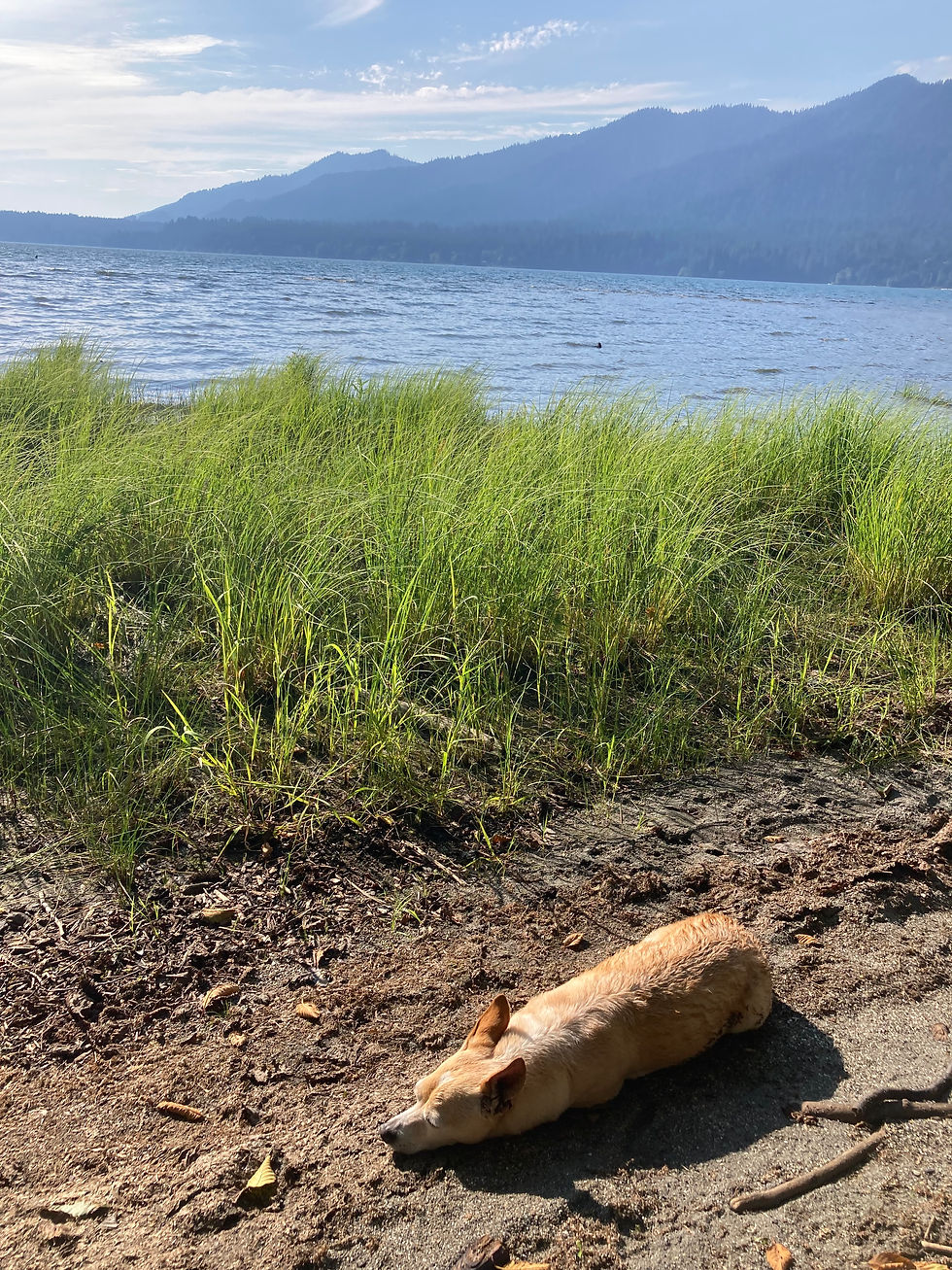From Indoor Confines to Outdoor Bliss: Rethinking Care Spaces
- Monica Eastway

- Nov 4, 2023
- 5 min read

Quotes are from qualitative studies examining how adults (age 60+) describe their experience of the natural world.

Feel the soft sand massaging your toes as you listen to the symphony of ocean waves cradling the shoreline.

Immerse yourself in the experience of a forest changing seasons, transitioning from summer to winter with leaves of red, purple, orange, and yellow, all while inhaling the crisp, energizing breeze.

Feast your gaze upon the glorious sunrise and sunset, painting the sky with hues of endless possibility.

As you look up into the starlit night sky, witness the grandeur of the Milky Way, a celestial masterpiece that ignites the darkness with its cosmic brilliance.
How do these experiences make you feel?
Calm? Peaceful? Invigorated? Renewed? Joyful? Inspired? Safe? Happy?
We all need Fresh Air and opportunities to connect with Nature.
Why is 'care' predominantly confined to indoor spaces?
We now know the aging process is impacted by genetics, variations in personal development and above all, our dialogue with our environments.
Our physical (human-built), social, and natural environments significantly affect our ability to enjoy harmonious living. Person-environment exchange (our experience of place) influences physical mobility, cognition, and can hinder or promote sensory health.
Environmental Gerontology seeks to understand, analyze, modify and optimize our natural, physical and social environments to promote living well for all ages, from birth to death.
Housing, community characteristics, and accessibility, including accessible green and blue spaces, have a significant impact on our ability to sustain and grow connectedness, to each other and Nature.
All ages need Nature accessibility, including parks, gardens, animals, orchards, forests, rivers, birds, lakes, and beaches.
The Nature Experience has definite effects on our health and well-being, including stimulating physical activity, improving mood and quality of life, and decreasing lonliness, isolation and depression while promoting purpose.
Nature immersion generates feelings of connectedness to Nature and a more profound sense of belonging to the natural world. Nurturing green and blue public spaces contributes to healthy lifestyles and buffers the effects of air pollution, heat waves, and floods while positively promoting physiological, psychological, social, educational, and environmental health = Simultaneously!

Fresh Outdoor Air vs. Indoor Air
The average American spends 90%+ of their time indoors, and according to the Environmental Protection Agency, and concentrations of some indoor air pollutants are up to five times greater than outdoor concentrations!
Apart from their indoor home environments, Americans spend 87% of their time in buildings, including offices, educational institutions, and health care facilities, 6% in vehicles, and just 7% of their time outdoors.
Indoor pollutants are rising and include ozone from air cleaners, molds, synthetic building materials found in furnishings, personal care products, household cleaners, and the lack of mechanical ventilation found in energy-efficient building construction.
Quality ventilation with outdoor air can reduce airborne illnesses, including SARS-CoV-2, the respiratory virus that causes Covid-19.
Think for a moment about our neighbors, who no longer drive, and who depend on their care partners to bring them outdoors to access fresh air, sunlight, and Nature.
Through the years, I have discovered the most nature-deprived people I know live or work in care facilities and people aging-in-place (at home) who lack transportation and accessible green or blue spaces.
Think about the places we practice 'Care.'
A growing body of literature indicates that skilled nursing facilities (nursing homes) have high indoor particulate and gaseous pollutants. Residents and their care partners spend most of their time indoors and are exposed to these indoor air pollutants for long periods. The Indoor air quality in nursing homes is not regulated and rarely monitored.
Even low concentrations of prolonged indoor air pollution exposure can adversely affect older adults' health, well-being, and quality of life while increasing medical expenditures due to frequent unscheduled hospitalizations due to severe episodes of illness.
I have known older adults who only go outside on their way to a doctor's appointment! I have known care teams who eat lunch at their desks, scroll on their iPhones, or sit in a break room with no windows or fresh air- if they are eating lunch at all.
Notice, the Biden-Harris Administration makes No Mention of regulating indoor air quality and increasing care outdoors as a step toward cracking down on nursing homes that endanger resident safety.
It does not have to be this way.
Researchers propose an action plan for assessing Indoor Air Quality in nursing homes that will safeguard the health of nursing home residents and staff- this is imperative to ensure cleaner indoor air for our neighbors residing in residential care facilities.
In addition, residents and staff will benefit by Sharing Care Outdoors and begin to take baby-steps toward normalizing the utiliization of outdoor spaces.
By denying those we care for and with access to the outdoors {daily fresh air and Nature}, we are also depriving ourselves of daily opportunities to enjoy the endless benefits of daily doses of fresh air the green prescription.
Care Outdoors, promotes Reciprocal-Shared Care: Caring In, Caring With, and Caring For Nature= Sharing Care.
Reciprocal-Shared Care can prevent caregiver burnout and guilt while providing opportunities for care receivers to connect with care recievers in mutually beneficial ways.
Greening Care From Soil to Soul
We can generate a Care Outdoors movement starting with Awareness.
Immerse in Nature. By experiencing the benefits of meaningful moments outdoors firsthand, you will begin to value them because they feel so good: I 100% guarantee!
It will become natural to Share Care Outdoors; it will feel more unnatural
being inside all the time.
Connecting with Nature has tremendous benefits for All Ages,
yet those who depend on others to help them access the outdoors are more likely to lack daily exposure.
Why not make the most of outdoor spaces and provide opportunities for embodied experiences in Nature?
From observing the beauty of Nature to taking awe walks, these experiences can positively impact the quality of life and wellbeing for older adults, care teams and all ages.
Let's value sensory engagement outdoors as a form of care
and ensure everyone can enjoy the endless benefits of Caring In, With and For Nature.
Are You Ready to learn simple yet profound ways to Share Care Outdoors while you reset your Carer Spirit?
All Ages Need Fresh Air and Nature
We Are Nature

"Home is where one starts from."
- T.S. Eliot
Learn HOW TO
Available as a Two-Day Online Learning Retreat
Certificate Upon Completion
Earn Continuing Education Credits!
Approved for 8 Instructional Hours
by the National Certification Council for Activity Professionals.
And for Kids =
GNOME Thyself!
A Care Outdoors Adventure for Kids!
of All Ages!
Empowering Youth to Share Care Outdoors 🌳
AWE, Smiles, and FUN Guaranteed!
Do you have children, work with children, work in child or elder care and want to co-create intergenerational outdoor experiences that
nurture nature connectedness,
joy, laughter, play, song and dance?
Join my mailing list and stay updated on the launch of this whimsical adventure!
Email: monica@monicaeastway.com
References
EPA. (n.d.). Indoor air in homes and coronavirus (Covid-19). https://www.epa.gov/coronavirus/indoor-air-homes-and-coronavirus-covid-19
EPA. (n.d.). Indoor air quality. What are the trends in indoor air quality and their effects on human health?https://www.epa.gov/report-environment/indoor-air-quality
Mannan, M., & Al-Ghamdi, S. G. (2021). Indoor air quality in buildings: a comprehensive review on the factors influencing air pollution in residential and commercial structure. International Journal of Environmental Research and Public Health, 18(6), 3276.
Reddy, M., Heidarinejad, M., Stephens, B., & Rubinstein, I. (2021). Adequate indoor air quality in nursing homes: An unmet medical need. Science of The Total Environment, 765, 144273.
Sánchez González, D. (2018). Natural landscape and environmental gerontology. Environmental Analysis & Ecology Studies.
Weir, K. (2020). Nurtured by nature. Psychological research is advancing our understanding of how time in nature can improve our mental health and sharpen our cognition. American Psychological Association.







